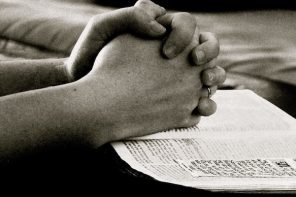The following is taken from my book, Wednesdays Were Pretty Normal: A Boy, Cancer, and God:
The Greeks thought believing exclusively involved the intellect. We have sort of adopted the same idea into our English understanding, that belief is about assenting to a certain set of facts you hold to be true. So the
how of believing, from that mind-set, involved proof. How you believe is by looking at an empirical set of evidence and then placing your stamp of approval when you see that it demands by logic to be believed. But the Hebrew mind-set is different. In a Hebrew context even the word believe takes on a different nuance, one that gets at the suggestion that believing is hard work.
The Hebrew word for believe is used all over the Old Testament, but sometimes it takes a little digging to find it. The word appears in Genesis 15:6: “Abram believed the Lord, and He credited it to him as righteousness.” This is pretty standard and fits fairly well with our concept of what believing and faith are all about. God told Abraham something, and Abraham took Him at His word. We do the same thing, and we should. God is trustworthy, and our faith in Him is not misplaced. But another usage of the word believe in Hebrew is a little more curious.
Exodus 17 is the old Bible story where General Joshua was sent out to fight the Amalekites. Moses presided over the battle, watching it take place below him in the valley. The account goes on to say that the pivotal action in the battle wasn’t a matter of strategic military planning or weaponry. The battle ebbed and flowed according to the position of Moses’ hands, far above the valley. When Moses held his hands in the air, the Israelites would win the battle. When he lowered them, the tide turned in favor of the Amalekites:
When Moses’ hands grew heavy, they took a stone and put it under him, and he sat down on it. Then Aaron and Hur supported his hands, one on one side and one on the other so that his hands remained steady until the sun went down. (Exod. 17:12)
So where’s the “belief” in the Exodus passage? The word believe is the same as the words translated into English as “remained steady.” Now that’s interesting and pretty revelatory about the Hebrew concept of belief.
In that understanding, believing isn’t something you float in and out of. It’s not just about the intellect; it’s about perseverance. It’s about remaining steady. And it reinforces what I sensed that afternoon—that if I wanted to believe, it wasn’t going to be easy. It was going to take work.
How do you believe? You work at it. And sometimes— many times—it’s hard work to believe. As hard as holding your hands above your head for an entire day. It’s hard to believe God when the circumstances of life are as heavy as your arms at 3:00 p.m. Yet even in this we believe that God will help us believe. We are, in some sense, fighting the battle for belief far below in the valley. And in our story Someone on the hill has His hands in the air. But unlike Moses we are confident that the One on the hill, our Advocate, does not grow tired and weary. Instead, Jesus is continually at the throne of the Father interceding on our behalf, praying for us as we pray for strength in the battle. His hands never go down.
You can order the paperback or Kindle edition here.
Subscribe to MichaelKelley.co
Never miss a new post. Subscribe to receive these posts in your inbox and to receive information about new discipleship resources.




